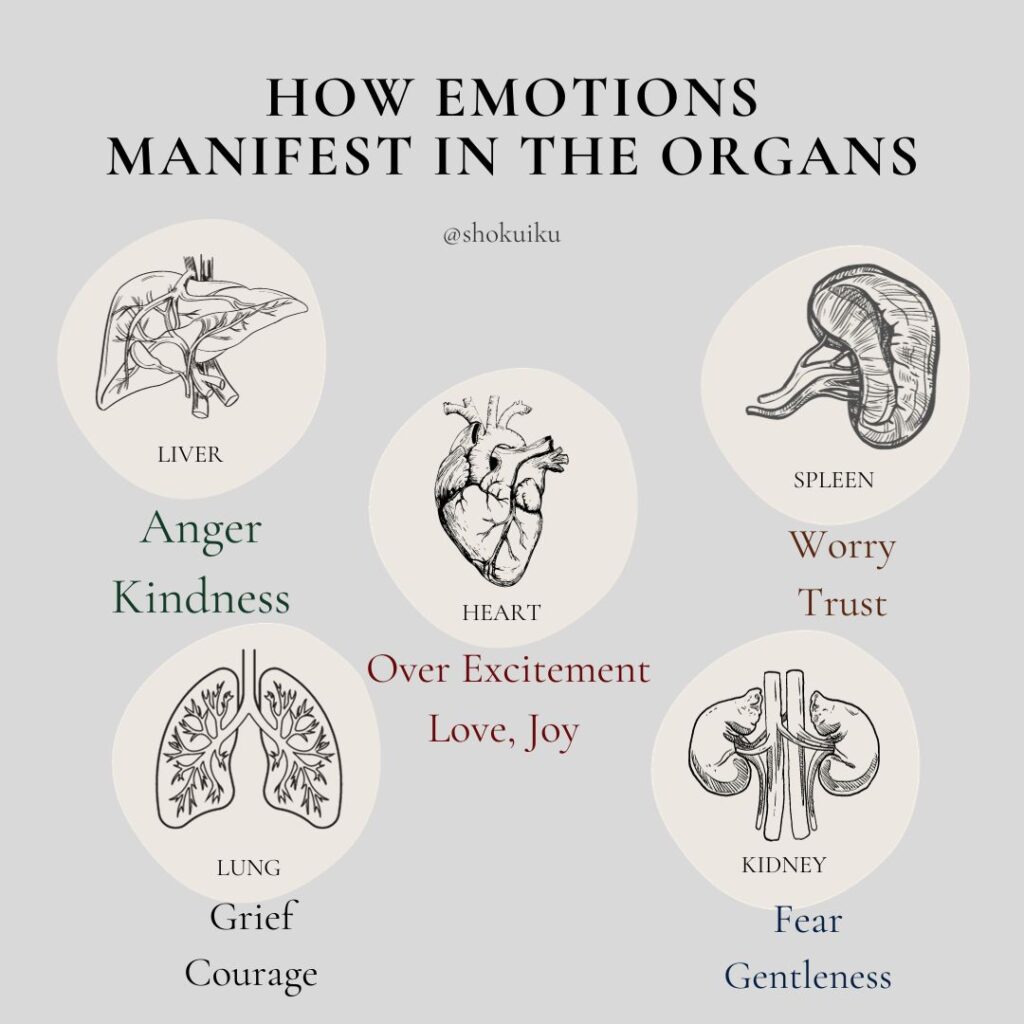
Cucumber & Tremella Granita
A Sicilian-style granita for hot days and hydrated cells When

Kick-start, energise, rejuvenate
All carefully planned and prepared to help nourish, reset and rejuvenate the body and mind.

We all experience occasional mood swings, but when emotional turbulence becomes a constant presence in our lives, it’s essential to delve deeper.
Your emotions may seem like they are in constant flux. Each passing month, you might find yourself experiencing various feelings. One month, you could be grappling with fear or sadness, while another might see you wrestling with anger or even indifference to your surroundings. Have you ever wondered why this happens? Certainly, external factors in your daily life can influence the prominence of certain emotions, but there is a more profound explanation for the recurring dominance of specific emotions.
Eastern medicine has long recognised the relationship between our emotions and the health of our organs. Understanding this relationship can offer insights into our overall well-being. Even though I am hesitant to label emotions as either “good” ‘bad” “positive” “negative”, all ranges of our emotions can be felt and affect each organ differently
In the following sections, we will explore each organ’s relationship with expressed emotions and the potential symptoms you may encounter.

Heart
Positive emotions: Love, Joy, and Happiness
Negative emotions: Hate, Impatience
Excitement or mania is primarily associated with the heart. When someone experiences excessive highs, it can strain their nervous system. Symptoms may include palpitations, insomnia, fuzzy thinking, or a propensity for risky behaviour. Mania is more common than one might think, often overshadowed by the stereotypical association of emotional struggles with sadness. On the surface, a manic individual may appear exceedingly happy and excitable, with a racing mind or a tendency to talk excessively. Achieving balance is crucial; alongside the highs, it’s important to experience moments of calmness to counterbalance and relax the heart.
Liver:
Recommend: Rose, Pearl powder, Cacao, Polygala, Poria, Holy basil
Positive emotions: Kindness and Generosity
Negative emotions: Anger, Frustration, Jealousy, Envy
The liver is the organ responsible for anger. Anger can manifest in various forms, including resentment, frustration, and outright rage. Associated symptoms might include blurred vision, dizziness, headaches concentrated at the top of the head, high blood pressure, or pain in the ribs. Balancing anger involves acknowledging and understanding it, which may lead to a shift toward sadness as a more constructive emotion.
Recommended: Schisandra, Reishi, Matcha, Dandelion, Milk thistle, Dokudami
Kidneys:
Positive emotions: Gentleness, Calmness and Silence
Negative emotions: Fear
Fear is closely linked with the kidneys and adrenal glands. It depletes your energy and has a downward, cooling effect. Weak adrenals can disrupt metabolic processes and digestion and may lead to hearing issues. If fear dominates your life, you’re likely dealing with these issues. Transforming fear into a more rational expression of sadness can signify a shift in your body’s response, with the potential for a move toward neutrality.
Recommended: He shou wu, Rehmannia, ashwagandha
Lungs:
Positive emotions: Courage, Righteousness
Negative emotions: Sadness, Depression
Grief or sadness corresponds with the lungs. Prolonged sadness weakens the nervous system, depletes energy, and leads to symptoms such as excessive crying, chest tightness, shortness of breath, asthma, frequent colds, and skin issues like psoriasis and eczema. In Chinese and Kampo medicine, the lungs are believed to control the skin’s pores, emphasizing the importance of nurturing and protecting the body’s protective layer.
Recommended: Cordyceps Militaris, Cordyceps Sinensis, Eleuthero
Spleen
Positive emotions: Fairness, Openness and Trust
Negative emotions: Worry, Anxiety, Mistrust
Worry is associated with the spleen. Overburdened spleen energy can lead to fatigue, memory issues, poor appetite, bloating, weight loss, paleness, and diminished hair, nail, and skin health. Balanced eating is essential when the spleen is affected, as nourishing the body can alleviate worry.
Recommended: Digestive Support, White atractylodes, Poria

When you understand the connection between organs and emotions, you gain the ability to address health concerns holistically. This means that you’re not just treating the physical symptoms but also integrating healing on an energetic level, promoting a more comprehensive approach to well-being.
It is also a practice to feel our feelings without judgment.
These are three tools to become more attuned to the sensations within our body:


A Sicilian-style granita for hot days and hydrated cells When

Ashitaba (Angelica keiskei) is often described as a “longevity herb.”

In our modern wellness landscape, “biohacking” often evokes images of
Copyright Shoku Iku © 2024 | All Rights Reserved.
The statements on this website have not been evaluated by the TGA or FDA. These products are not intended to diagnose, treat, cure or prevent any disease.
Sign up to receive your discount.